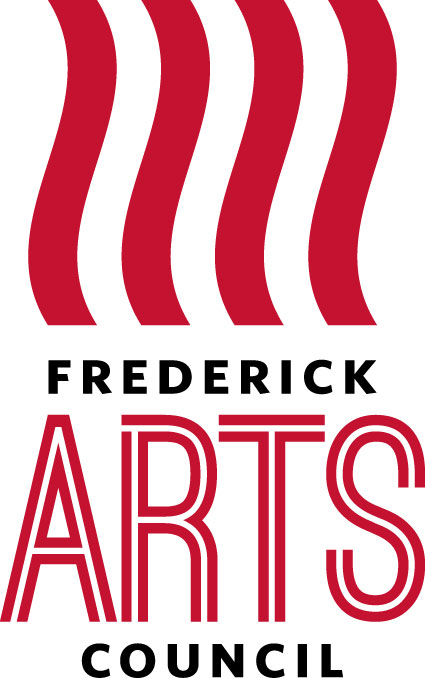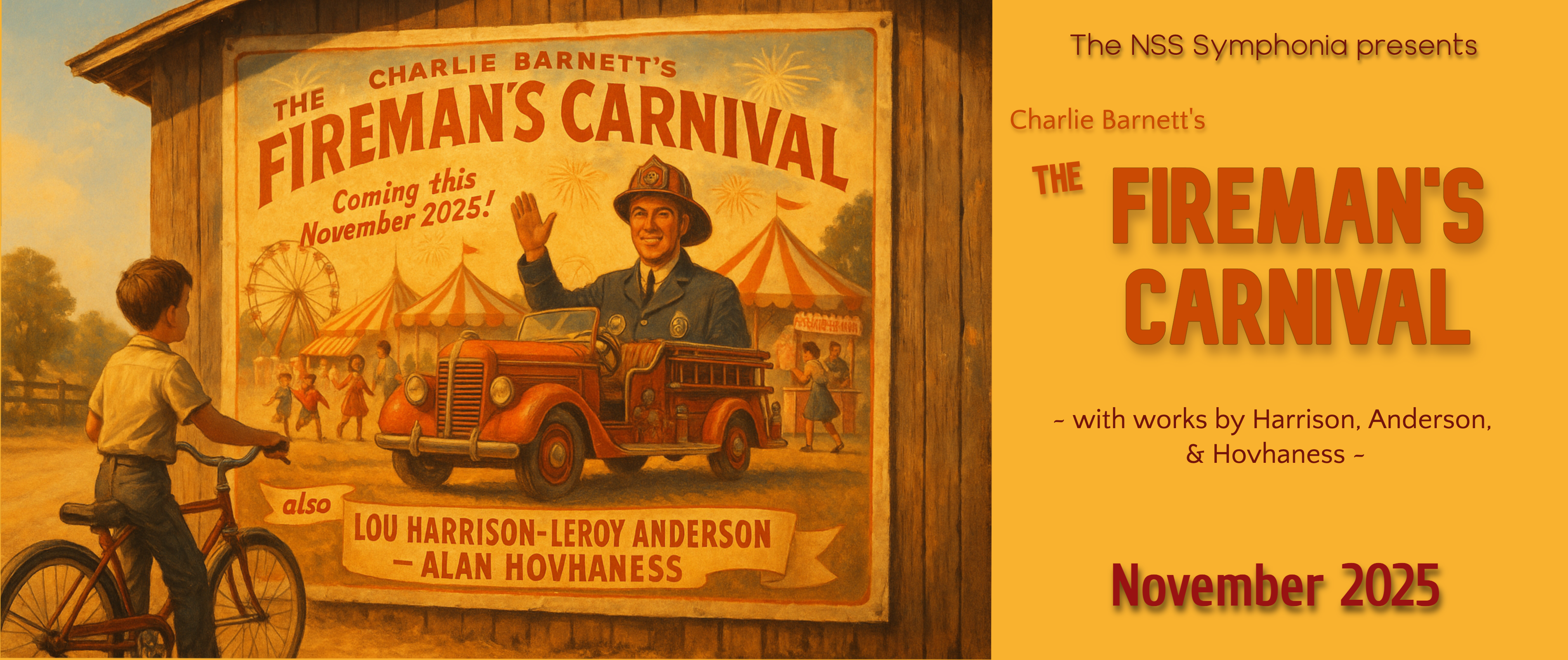Charlie Barnett: The Fireman's Carnival
Program
Shooting Gallery
Ferris Wheel
House of Mirrors
Dreams
Chorale, "Et in Arcadio Ego"
Double Fugue, "in Honor of Heracles"
Ductia, "in Honor of Eros"
Lament
Canonic Variations, "in Honor of Apollo"
Little Fugue, "Viola's Reward"
Round, "in Honor of Hermes"
Nocturne
Plink, Plank, Plunk! (1951)
Arietta (1962)
Leroy Anderson
Few American composers have captured the joy and charm of light orchestral music as brilliantly as Leroy Anderson (1908–1975). A master of melody, rhythm, and wit, Anderson is best known for his delightful miniatures–many of them composed for the Boston Pops under conductor Arthur Fiedler. Works like The Syncopated Clock, Sleigh Ride, and The Typewriter have become iconic, loved by audiences of all ages.
Composed in 1951, Plink, Plank, Plunk! is one of Anderson's most whimsical creations. Scored for strings (with optional percussion), it features the string players using pizzicato technique–plucking the strings instead of using the bow. The result is a piece full of playful energy, rhythmic bounce, and irresistible good humor. Each section of the string orchestra gets a chance to shine, weaving together in a kind of musical game that is as fun to watch as it is to hear. The title says it all: Plink, Plank, Plunk! isn't about grand statements or deep emotion–it's a light-hearted celebration of sound and precision, with a touch of mischief. It has also served as the theme for the TV show The Friendly Giant, further cementing its place in popular culture. Whether performed in a concert hall or at a pops concert, this charming little piece never fails to bring smiles and delight. It's Leroy Anderson at his cleverest–short, sweet, and utterly unforgettable.
Though best known for his sparkling light orchestral pieces Plink, Plank, Plunk!, Anderson was also a gifted composer of elegant, expressive music. Arietta, written in 1962, reveals the more lyrical, introspective side of Anderson's musical personality, living up to its name–suggesting a "little aria" or simple, song-like melody. The work unfolds gently, with a warm, singing line that passes through the strings in a calm, pastoral atmosphere. The harmonies are rich but understated, and the overall mood is one of quiet reflection and tenderness. While many of Anderson's compositions are filled with wit and rhythmic flair, Arietta showcases his mastery of melodic writing and emotional nuance. It invites listeners to pause and breathe, offering a moment of serene beauty. This piece often surprises those who know Anderson only for his humorous works, revealing his versatility and sensitivity as a composer. Arietta is a reminder that even within a few short minutes, music can speak volumes–about grace, restraint, and the power of a simple melody well told.
Celestial Fantasy (Op. 44)
Alan Hovhaness
Alan Hovhaness (1911–2000) was one of America's most distinctive and spiritually driven composers, known for his prolific output and his seamless blend of Eastern and Western musical traditions. Born in Massachusetts to an Armenian father and a Scottish-American mother, Hovhaness drew deeply from Armenian liturgical music, Indian raga, Japanese gagaku, and early Western counterpoint, creating a uniquely mystical and contemplative style.
Celestial Fantasy, composed in 1944, is an early but mature example of Hovhaness' lifelong devotion to the sublime and the eternal. True to its title, the piece evokes a sense of cosmic wonder and otherworldly serenity. Scored for string orchestra, the work features slow-moving, chant-like melodic lines, modal harmonies, and polyphonic textures that unfold with an almost ritualistic calm. Hovhaness often described his music as an attempt to reach "a sense of the unknown, a sense of the infinite," and Celestial Fantasy embodies that quest with reverent clarity.
Though compact in form, the piece resonates with a spiritual expansiveness that defies its brevity. Listeners may hear echoes of ancient hymns, Eastern liturgies, or the quiet majesty of starlit skies. The music invites introspection, unfolding at a pace that encourages deep listening and a release from temporal concerns. Today, Celestial Fantasy stands as a luminous example of Hovhaness' vision–music as a form of meditation, a bridge between the earthly and the divine.
The Fireman's Carnival (2008)
Charlie Barnett
Composer Charlie Barnett brings his rich background in jazz, film, and classical music to this colorful suite for string orchestra, The Fireman's Carnival. Full of nostalgic Americana, the piece invites listeners to step into the world of a small-town summer carnival–complete with flickering lights, distant music, and the warm buzz of community celebration.
Structured in five short movements, each section paints a distinct scene:
- Twilight Bicycle Ride opens the suite with playful energy, propelled by rhythmic motion and bright orchestration, evoking a young boy pedaling excitedly down a quiet road to the carnival.
- Shooting Gallery adds percussive precision and flair, with sparkling orchestration and quickfire motifs that evoke the pinging of pellets and ringing prize bells.
- Ferris Wheel offers a dreamy ascent, where the orchestra sways gently to capture the rise and fall of the ride and the soft wonder of seeing the town from above.
- House of Mirrors is full of off-kilter rhythms and eerie harmonies, musically mimicking shifting reflections and optical illusions.
- Dreams closes the suite with a gentle, lyrical meditation–fading lights, quiet conversations, and the drifting haze of memory.
Two instruments play special roles throughout the suite. The solo clarinet often acts as a narrator, weaving through scenes with sly charm or wistful lyricism, while the harp adds a shimmering layer of fantasy–especially in the Ferris Wheel and Dreams movements, where its glissandi and delicate textures lift the music into a dreamlike realm.
Both evocative and entertaining, The Fireman's Carnival is a celebration of small joys and summer nights. Barnett's music draws listeners in with its cinematic color, emotional warmth, and storytelling spirit–leaving behind a sense of wonder, like the memory of a perfect evening under carnival lights.
Suite for Symphonic Strings (1958)
Lou Harrison
Lou Harrison (1917–2003) was a pioneering American composer known for blending Western classical traditions with the music of Asia, especially from Indonesia, China, and Japan. A student of Henry Cowell and friend of John Cage, Harrison developed a highly personal style marked by rhythmic vitality, modal melodies, and an openness to non-Western instruments and tuning systems.
Though grounded in familiar forms–like the Air, Gigue, and Chaconne–the suite departs from tradition with its unusual harmonic language, employing modal melodies influenced by Asian and early European music. The textures are often transparent, with an emphasis on clarity and lyrical counterpoint, allowing the strings to resonate with a uniquely shimmering quality.
The Suite for Symphonic Strings reflects Harrison's belief in music as a unifying, spiritual force. There is both warmth and intellectual rigor in this music, as well as a sense of timelessness–ancient and modern voices coexisting in harmony. The suite is a testament to Harrison's commitment to beauty, craft, and cultural inclusivity. In a world of increasing artistic cross-pollination, Harrison's suite feels both ahead of its time and deeply rooted in musical tradition.
Concert Notes
NSS concerts typically last around two hours, including a 15-minute intermission.
Sponsors
The National String Symphonia is grateful for support from:
Primary Sponsors


Additional Sponsors


